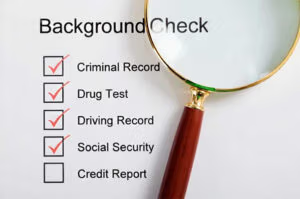Background screenings, also known as background checks, are a process of verifying the information provided by an individual or organization. They are used to assess the trustworthiness, reliability, and suitability of an individual or organization for a specific purpose, such as employment, volunteering, or adoption.
Background screenings are important for businesses, organizations, and individuals for several reasons:
- Legal compliance: Many businesses and organizations are required by law to conduct background checks on employees or volunteers in certain industries, such as education, healthcare, and finance. This is to ensure that they are hiring or working with individuals who are fit for the role and do not pose a risk to the organization or the public.
- Public safety: Background checks can help to ensure the safety of employees, customers, and the public by identifying individuals who have a history of criminal behavior or abuse.
- Reputation: Conducting background checks can help businesses and organizations protect their reputation by ensuring that they are not hiring or working with individuals who have a history of unethical behavior or poor performance.
- Personal protection: Individuals can also benefit from background checks by using them to verify the credibility and trustworthiness of potential partners, roommates, or caregivers. This can help to protect their personal safety and well-being.
There are various types of background checks that are commonly conducted, including:
- Criminal history checks: These checks involve searching criminal records to determine if an individual has been arrested, charged, or convicted of a crime. They may include local, state, and national records, as well as records from other countries if applicable.
- Employment verification: This type of check involves verifying an individual’s employment history, including their job titles, responsibilities, and dates of employment.
- Education verification: This check involves verifying an individual’s educational background, including the degree earned, the institution attended, and the dates of attendance.
- Credit checks: These checks involve reviewing an individual’s credit history, including their credit score, outstanding debts, and payment history. Credit checks are often conducted for financial positions or for positions that involve handling money.
- Professional license verification: This check involves verifying that an individual holds a valid professional license or certification in their field of work.
- Reference checks: This check involves contacting an individual’s references, such as former employers or colleagues, to gather information about their work performance, skills, and personal character.
- Drug testing: Some employers or organizations may require drug testing as part of their background check process to ensure that their employees or volunteers are not using illegal drugs.
- There are many other types of background checks that may be conducted depending on the specific needs and requirements of the individual or organization.
Businesses and organizations need to be aware of several legal considerations when conducting background checks, including:
- Discrimination laws: Federal and state laws prohibit discrimination based on race, color, religion, national origin, gender, age, disability, and other protected characteristics. This means that employers and organizations cannot use background check information to unfairly exclude or favor candidates based on these characteristics.
- Privacy laws: Federal and state laws protect the privacy of individuals by regulating how personal information can be collected, used, and shared. Employers and organizations need to be careful to only request and use information that is relevant to the job or position and to obtain consent from the individual before conducting a background check.
- Consent laws: In most cases, employers and organizations are required to obtain written consent from the individual before conducting a background check. This includes providing the individual with a clear and conspicuous disclosure of the types of information that will be checked and the purpose of the check.
It is important for businesses and organizations to consult with legal counsel and ensure that their background check processes are compliant with relevant laws. Failure to comply with these laws can result in legal liability and damage to the organization’s reputation.
Thailand
In Thailand, companies are required to conduct background checks on potential employees as part of the hiring process. The types of background checks that may be conducted include criminal record checks, employment verification, education verification, and drug testing.
Under Thai law, employers are prohibited from discriminating against job applicants on the basis of race, religion, national origin, gender, age, disability, and other protected characteristics. This means that employers cannot use background check information to unfairly exclude or favor candidates based on these characteristics.
Employers in Thailand are also required to protect the privacy of job applicants and to obtain their consent before conducting a background check. This includes providing the applicant with a clear and conspicuous disclosure of the types of information that will be checked and the purpose of the check.
It is important for companies in Thailand to ensure that their background check processes are compliant with relevant laws and best practices. This can help to protect the company’s reputation and minimize the risk of legal liability.








